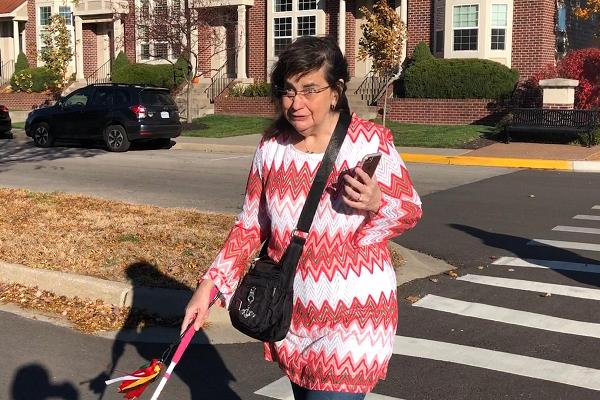Wendy Poth, my aunt, lost her sight when she was 7. She’s now completely blind, so she doesn’t see shadows, faces or even the darkness when she closes her eyes.
Wendy, who’s now in her 60s, has lived an independent life as a therapist and trained social worker. These days, she’s a die-hard technology enthusiast and is rarely seen at home without her Apple Watch Series 3, Amazon Echo and iPhone, which she uses to get news updates, call friends and track her daily activity.
So I wasn’t surprised to learn that Wendy signed up to be among the first to try out a new product for the blind and partially sighted called Aira.
Here’s how it works:
Wendy puts on a pair of Google Glass, picks up her iPhone and uses Siri to place a call to Aira’s network of “agents.” As we strolled through Kansas City’s downtown plaza, she asked her designated agent — Wendell was his name — how to navigate to a coffee shop and read the menu.

Her agent was careful to stay quiet as she walked in the right direction. Wendy had requested only light chatter so she could listen to the sounds of the street traffic.
Previously, she relied on a cane and her acute sense of hearing. For a variety of reasons, she hasn’t had a guide dog in several years.
When Aira worked, Wendy said the experience was “magic.” The agent relied on the camera feed recorded via Google Glass and used Google Maps to help her get around and provide specific instructions, like suggesting she move eight steps to the right.
It gave her a feeling of independence.
“I don’t need to ask anybody for assistance,” she said. “And I don’t have to be nice when I am in a bad mood.”
Wendy also didn’t care whether the Google Glass made her look nerdy, a common complaint among the sighted, or that she was giving up some personal privacy by sharing her location in such detail. The utility more than compensated for any of the downsides.
It still needs work
But she was also reluctant to refer to Aira as a “tool” — at least, not yet. The company is still gathering feedback from its first users to fine-tune the product. It’s also expensive, with the service starting at $89 a month, especially for people with disabilities or health problems. Wendy also has chronic respiratory issues.
One problem with Aira is that the completely blind can’t tell whether the light is optimal to record footage. If it’s too sunny or too dark, the agent won’t be able to see much.
But Wendy said she’s confident that the product will improve over time. And she’s glad that Aira wants to help.
“This is one of the only professional apps (for the blind) that I am aware of,” she said.

Playing
Share this video…
Watch Next…
Article source: https://www.cnbc.com/2017/11/22/how-this-google-glass-app-helped-my-blind-aunt-get-around.html

